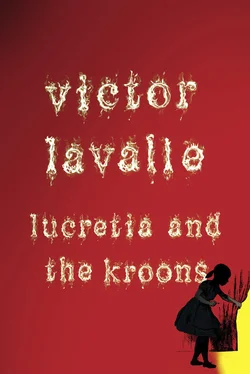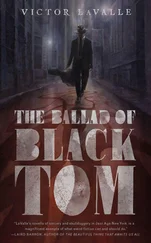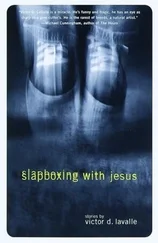Loochie spoke in a tense whisper. “I’m coming!”
Then Loochie climbed out the window.
Children who grow up in the suburbs learn to climb trees. Kids from Queens learn to climb fire escapes. In the summer Loochie’s fire escape was like a rusty balcony. If the apartment felt too warm she’d sneak out onto the fire escape to cool down. Some nights she even slept out there, calling it a Queens camping trip. Even now, in late December, with a dusting of snow on each step, she gripped the handrails and climbed fast. The hardest thing to take was the cold. By the time she’d made it to the fifth floor, only one flight up, she was shivering. But when she reached the landing of the floor above hers she forgot about the chill and being so high. There, in the window, framed like a photo, sat Zhao Hun Soong.
“Sunny,” Loochie whispered.
Her best friend looked so tiny. Or had Loochie just grown bigger?
Sunny Soong had always been small for her age. If she and Loochie hadn’t lived only one floor apart Loochie likely would never have noticed the kid. Would’ve assumed Sunny was two grades behind her and therefore not friendship material. But when Loochie and her mother would head downstairs in the elevator each morning — first grade, second grade, third grade — Sunny and her uncommunicative grandmother would be in the elevator, too. They would walk the same route all the way to P.S. 120 and at a certain point the two girls began to talk with each other, even if the adults didn’t. If they’d lived in two different buildings, or even on two different sides of this building, they probably wouldn’t even have met. Sometimes Loochie just couldn’t believe the good luck of it.
But Loochie had a hard time thinking of good luck just now. Sunny sat in a chair in the kitchen, her hands resting on the windowsill, and her skin seemed translucent. Veins were visible, tracing their way across the backs of her hands, all the way to her knuckles. The veins weren’t even blue, but a deep, dark gray, the color of wet cement. Sunny’s face had become so fat and pale that her small nose, her tiny mouth, seemed to be floating in a bowl of custard. Her eyelids were red and puffy.
The one touch of liveliness was a blue knit cap that she wore pulled down to her eyebrows. It was the blue of a bright sky. And attached to the top, by two short strings, were a pair of pompoms. They sat on her head like mouse’s ears. They were the kind of gift someone might give to make a sick child feel whimsical, to graft youth back onto a decaying body.
“You look great,” Loochie lied.
Sunny didn’t speak, just stared. Loochie could hear Sunny’s breathing, raspy and weak. Sunny inhaled deeply three times before she could gather the strength to respond.
“ This is what I look like,” Sunny said as she grabbed the top of the cap with an almost angry determination and yanked it off her head.
Sunny’s hair had become so thin that Loochie could see her scalp, almost pale green like a honeydew melon. It was like she was fading right before Loochie’s eyes. Even at twelve years old, Loochie knew not to betray her sadness. She held her face still as best she could. She smiled weakly. “Your pajamas are cute,” she offered.
The long-sleeved top of Sunny’s outfit was purple with a lime collar and cuffs. There was a giant green electric guitar and next to that four big pink letters: R-O-C-K. The pajama bottoms were pink with that same image printed all over them in a much smaller size. The green electric guitar and the word ROCK running up and down her legs. The ankles had lime cuffs, too. The pajamas were not cute and they both knew it. Under different circumstances they would’ve laughed about them, but not right then.
“Welcome back,” Loochie said, just to change the subject, and though she didn’t want to do it she looked away from her friend because she was afraid she might cry.
When Loochie looked back Sunny had put the blue cap back on. She’d pulled her hands back inside the window and they were in her lap. She was looking down at those hands and her face wore a look of serious concentration. One of her hands was closed in a fist. Sunny tried to lift it but each time she did the hand trembled and, a moment later, fell back into her lap. Loochie watched this happen twice. Sunny’s shoulders heaved now. She was wearing herself out just trying to do this simple thing, just trying to lift her hand. She was supposed to be getting better!
But who had actually told Loochie that?
Before Sunny got so sick she’d had this way of looking at people. She’d set her lips tight and squint her eyes and sort of lean forward, like she was about to jump right on their heads and stomp them. It made her look like the tiniest gangster ever. It intimidated everyone except her grandmother.
One time, maybe four years back, the two of them had been at Flushing Meadows Park and wandered into one of the meadows so they could kick off their shoes and walk in the summer grass. They were having a pretty good time when suddenly this beast came galloping right at them. It was just a dog, a Doberman pinscher, but to those girls it might as well have been a horse. And it shot straight toward them. The owner was nowhere to be seen. The thing was coming for them and it started barking and Loochie cried right there. She thought it was going to tear off their heads. As the dog got closer, its face, with those high, pointy ears and the long, narrow snout, looked downright demonic. Even worse when it bared it teeth. Loochie was busy looking for her mother, or Sunny’s grandmother — where had they wandered off to? But then Sunny bore down in her gangster pose and, no lie, the girl growled at the dog. And do you know that dog actually changed direction? It bounded away from them. Sunny had scared it off. The whole time she didn’t even shiver. As far as Loochie was concerned, Sunny saved her life that day.
So how could that hero in the park be the invalid here now? The one who couldn’t even lift her hand out of her lap?
Finally Loochie leaned into the window and held Sunny’s hand and lifted it for her.
Relieved, Sunny opened her fingers. “I’ve got something for us,” she said.
Three brittle-looking little twists of paper sat in Sunny’s palm.
“I took these from my grandmother,” Sunny said. “Take them.”
Loochie snatched them with her free hand, then let Sunny’s hand go. It immediately dropped, as if it weighed a thousand pounds, and landed in her lap again.
Sunny reached to a cup of water sitting on the kitchen table inside her apartment. She grabbed the plastic cup and inhaled deeply and lifted it to her lips. She sipped twice. The skin on Sunny’s neck was so thin. It was as if Loochie could actually see the water sliding down the inside of her best friend’s throat. Loochie turned away fast. She looked at her own palm. All three little white sticks. They weren’t much bigger than toothpicks.
“Chinese cigarettes,” Sunny said, after she’d set the cup back down, almost out of breath from the action. “Hand rolled.” Another breath. “Strong stuff.”
Cigarettes? It took a moment before Loochie could speak. “I thought we could ride my bike inside the apartment,” she said, and her voice sounded as small as her planned rebellion.
Somewhere inside the apartment a woman’s voice called out in Cantonese. Sunny’s grandmother. Sunny looked over her shoulder, then back at Loochie. That move tired Sunny out, too. She winced and breathed heavily and Loochie just couldn’t believe that this was Sunny.
“I’m going to sneak a lighter with me,” Sunny said. “But my grandmother would find these cigarettes if I tried to take them down. She’d probably smell them or something. You hold on to them. I’ll be down in a couple of minutes.”
Читать дальше












